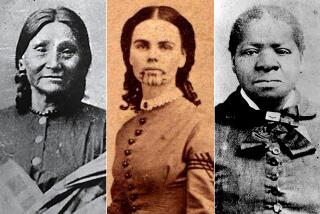Humor and grit win the West
- Share via
The third volume of Larry McMurtry’s planned four-volume saga about a wealthy English family’s safari through the American West in the 1830s begins where the second ended: at a trappers’ rendezvous in the Rocky Mountains after a battle with Ute warriors. The heroine, Lady Tasmin Berrybender, married to frontiersman Jim Snow, is nursing the gravely wounded scout Pomp Charbonneau back to health. While Jim is away, she falls in love with the gentler and more cultured Pomp.
Two problems, however, confront Tasmin. First, Pomp seems insufficiently attached to life. It takes all her determination to keep him from slipping “into the easeful shadows.” He explains that his mother, Sacagawea, guide to the Lewis and Clark expedition, told him he “was born by sorrow’s river. I seem to carry a weight. It keeps me from being quite like other men.” Second, though fond of Tasmin, Pomp seems indifferent to her attempts to seduce him. This nettles Tasmin, a beauty who has all the other men in camp infatuated with her.
Their frustrated romance occupies the foreground of “By Sorrow’s River,” during which the Berrybenders trek south by horse and wagon to Santa Fe, escorted by mountain men Kit Carson, Jim Bridger and Hugh Glass. McMurtry meditates on the qualities of character that conquered the West. Pomp’s civilization is useless there, whereas Jim Snow’s simple-minded toughness -- he even slaps Tasmin around -- seems to be just what the untamed country requires. Somewhat shocked, Tasmin detects this necessary hardness in her sexual appetite and in the heedless selfishness that keeps her father, Lord Albany Berrybender, on the trail despite repeated disasters.
As in the first two volumes, “Sin Killer” and “The Wandering Hill,” members of the party are constantly dying or wandering off, to be replaced by fresh characters. And again McMurtry manages to balance the bloodshed and tragedy with insouciant good humor. One advantage of the multi-book format, with short chapters and varying points of view, is that the characters have little time to brood. Even the pluckiest real-life pioneers would be downcast after so many deaths and dismemberments, but this is a picaresque tale that encourages us to forget quickly -- just as Berrybender’s daughters and mistress (not Victorians, it should be pointed out, but lusty holdovers from the 18th century world of Henry Fielding and William Hogarth) do by having babies with almost any man available.
The novel’s middle ground is comic, in a grim way. In one typical scene, two European journalists astound a Sioux war party by inflating a hot-air balloon and soaring away, unaware how close they came to being tortured and killed. In another, Cheyenne warriors in a tolerant mood spare the lives of Pawnee teenagers who try to steal their horses. The Pawnees, their pride stung, then attack the wagon train, with fatal results for unarmed Berrybender servants and Native American boys alike.
In the background, meanwhile, we hear elegiac notes. Though the era we commonly call the Old West has half a century to go, parts of it are already dying. Smallpox sweeps up the Missouri River, leaving Mandan villages full of rotting corpses. Mountain men are running out of beaver to trap; they foresee that “the free life in the high Rockies ... might be finished, its end come before their end.” A Sioux chief watching the balloon take off realizes that his tribe is ultimately doomed: “The white men ... were superior, not in heart but in invention. Many of the People were brave, but none of them could fly.”
Nothing keeps the travelers from reaching Santa Fe: not lack of water; not slave traders; not the Ear Taker, a stealthy tribesman with a sharp knife who does just what his name describes; not an embittered Mexican army captain who has reason to consider Pomp his mortal enemy. But what will they do in Book 4? The Berrybenders are tourists, not pioneers. Yet they have gone half native already. “Sooner or later,” Tasmin muses, “unless we’re all killed, my father will hunt his way to an ocean where there are boats that go to Europe.” She wants to educate her children in England, but Jim would never leave the wilderness. Which world will win -- Old or New? And how? Even this far along, McMurtry keeps us guessing. *
More to Read
Sign up for our Book Club newsletter
Get the latest news, events and more from the Los Angeles Times Book Club, and help us get L.A. reading and talking.
You may occasionally receive promotional content from the Los Angeles Times.







